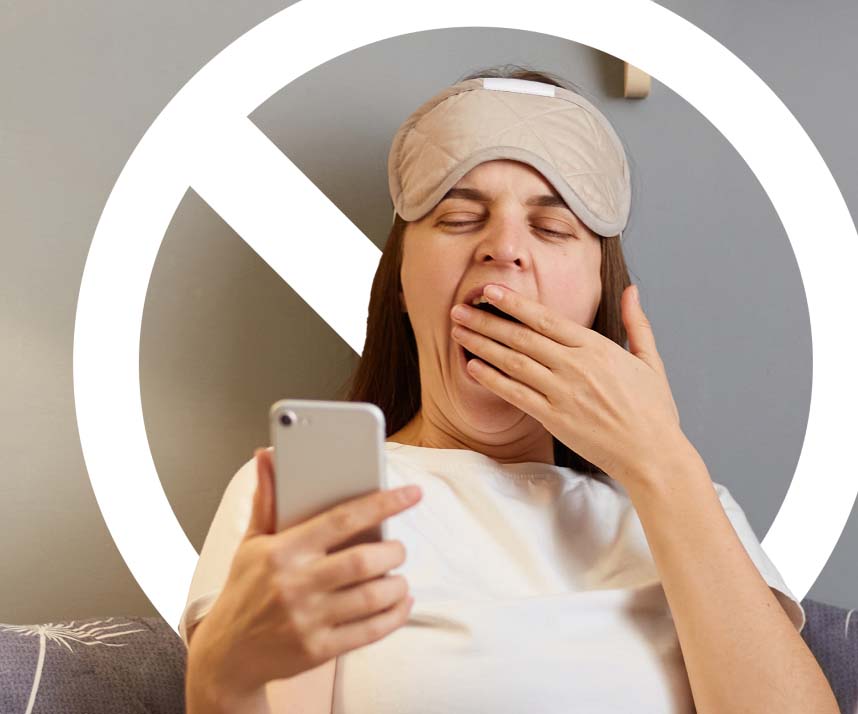Restful sleep is absolutely vital to a productive day. Research has shown a lack of quality sleep significantly affects your work productivity, focus, brain performance, mood, eating patterns, and overall health. We all crave getting enough hours of uninterrupted sleep consistently so that we can feel refreshed and function optimally during the day. Just being mindful about the environment we create to promote sleep can make a major difference in our overall sleeping patterns. One simple way to determine what changes may need to be made in our sleep environment is to think about each of our five senses, and how our sleep environment is affecting them.
Sense of Sight
If possible, dim your lights one to two hours before you sleep. Our bodies respond to darkness by producing melatonin, the chemical which helps create the feeling of sleepiness. Wearing an eye mask or darkening your room with window shades can help in blocking out excess light. Creating a restful state also means shutting off the computer and minimizing screen time a couple hours before sleep. The artificial light of electronic devices impacts our body’s circadian rhythm, a natural process that helps to regulate our sleep. Overuse of screens late in the evening can affect your natural ability to feel sleepy; unfortunately, this is a common pitfall for many of us. Be mindful, and limit screen time before bed.
Keeping your bedroom clean and organized can also affect your ability to fall asleep. Visual reminders all around us of messes to clean, laundry to fold, and work to be done can detract from the good work we’ve done limiting harmful light. Dr. Salas of John Hopkins, points out that clutter isn’t just impractical, it actively stresses us out. A stressed mind is not conducive to a good night’s rest. An easy yet powerful way to minimize visual barriers to good sleep is simply to block out a couple quick minutes in your bedtime routine to tidy up your sleeping space!
Sense of Hearing
Sense of Touch
What our bodies find comfortable to touch and feel can also have a major impact on our sleep. Finding a quality mattress can be the difference between waking up comfortable and relaxed, and waking up with aches and pains from constant tossing and turning. What we sleep on is important, and an investment worth making since sleep makes up, on average, a third of our lifetime. Just like a comfortable chair can promote better focus at work, a quality mattress can promote more restful sleep. Good bedding and pillows are also vital. From material preference with your sheets to the firmness of your pillows, if you don’t feel comfortable, take time to research and experimenting until you are comfortable. Accomodating our sense of touch also includes being aware of ambient temperature. The National Sleep Foundation recommends a cool room with a temperature of 60-68 degrees Fahrenheit to promote quality sleep. If needed, turning on a fan or heater, opening a window, or adjusting the number and type of sheets or blankets can help dial-in the temperature in your bedroom to optimal comfort.
Sense of Smell
Sense of Taste
Though we may not think about eating as part of our sleeping environment, it is important to address, since it can take 2-3 hours to digest any meal. Lying down immediately after eating a meal can lead to discomfort and difficulty sleeping. Be mindful of your meal times, and make adjustments as necessary. Drinking chamomile tea with dinner or during your bedtime wind-down routine can help relax the body and mind. Make sure to avoid drinking any liquid too late in the evening, however, since drinking liquids in large quantities late in the evening may disrupt your sleep with repeat trips to the bathroom. Also important to note is that while alcohol may act as a sedative, it can negatively affect the quality of your sleep. Caffeine should also be avoided late in the day as it is shown to negatively impact our ability to fall and stay asleep.
Simple adjustments to your environment can have a profound positive impact on the quality of our sleep. Since the quality of your day is greatly dependent on your sleep patterns, we highly recommend investing appropriate time in optimizing your sleeping environment. With the Innergy app, you can find expert advice on how to improve sleep and optimize your ability to live a better life. You can even find a vareity of meditation techniques to incorporate into your bedtime routine and help with relaxation. Don’t forget: quality sleep is vital for a healthy mind and body.



